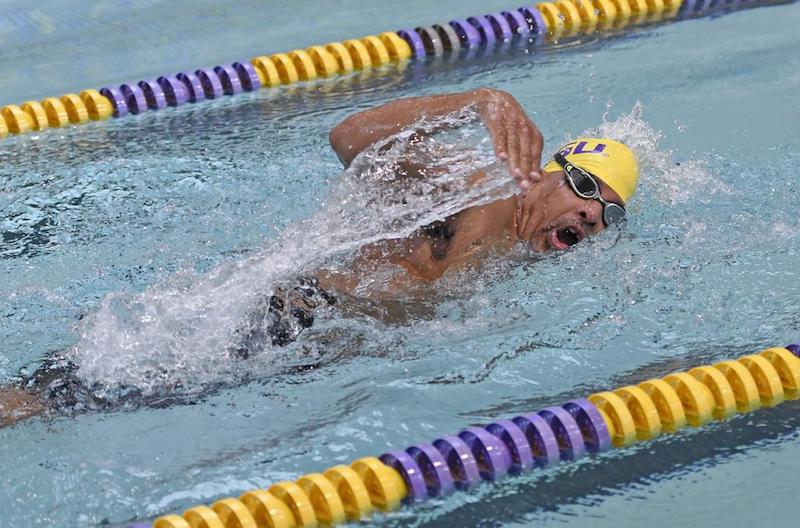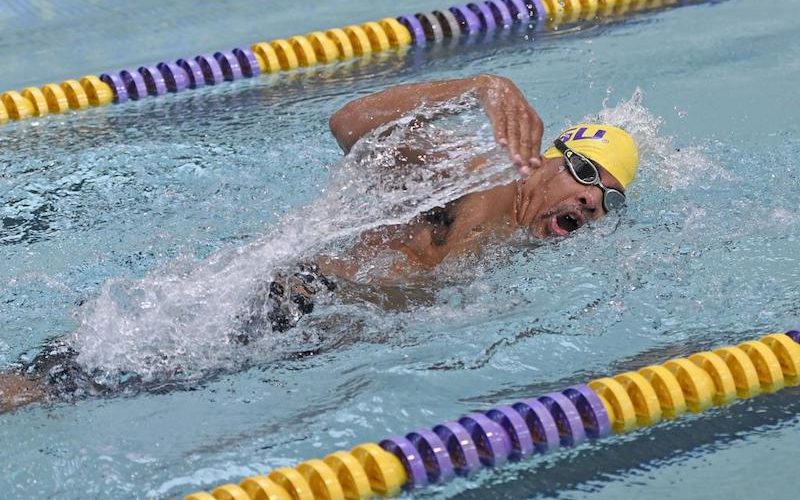 Some people are born fighters, and they don’t lose that spirit just because they reach a certain age.
Some people are born fighters, and they don’t lose that spirit just because they reach a certain age.
Take Herman Kelly, for example.
His first name means soldier or warrior in German, and Herman started life by spending seven days in an incubator, fighting for life. He endured racism common in his childhood. He became a champion swimmer despite being prevented from using pools then because he is black.
Now turning 68, Herman dove back into serious swimming after his doctor gave him a stern warning, spurring him to fight yet again. He had become overweight, and he told his doctor he didn’t want to go on any medication.
So exercise became the answer for the Louisiana State University instructor and church pastor.
Now he recoils from a photo from his son’s graduation from the police academy.
“I had a gut,” he said.
Herman’s focus is on this year’s National Senior Games in Fort Lauderdale.
“I have to at least get the top 12,” he says, confident. “As soon as I see another competitor in the pool again, my adrenaline will shoot up, and I’ll knock that six seconds off.”
Training Determination
Anyone over 50 can be inspired by Herman’s dedication, even if you don’t like to swim or train seriously.
He’s up at 4:30 a.m. four days a week. Workouts can cover 4,400 yards, he said.
“I set goals for myself and sometimes they can be unrealistic, but that’s just who I am,” he says. “I like people to tell me I can’t do something.”
When he was a kid in Jacksonville, Florida, black people were banned from most pools. They had to take their chances in creeks and the ocean. Herman’s parents arranged for him to learn at a nearby pool for African Americans.
The roots in the low swimming rates among African-Americans go back to slavery, when they were restricted from water to discourage escapes, USA Swimming says. “Slaves were told that the measures had been enacted for their benefit since everyone knew that black folks were poor swimmers. As time passed, more and more blacks came to believe this.”
Nowadays, African-Americans still drown at alarmingly high rates, says USA Swimming.
“Dozens of organizations across the country have developed learn-to-swim programs aimed primarily at minority youngsters,” the organization says.
‘Then I’ll Be Really Fast’
By the time he was ready for college, Herman had set his sights on the Morehouse in Atlanta, with its famous Tiger Shark swim team. He made the team all four years. For two, Morehouse was the national champion among Historically Black Colleges and Universities.
He’s been teaching at LSU for more than 20 years and has no plans to slow down.
“I still have about six more years of work. Then I’ll retire, and start training in the pool twice a week, and then I’ll really be fast,” Herman says.
Working out at the gym is great for all athletic pursuit, including swimming. Let us show you how to keep fighting for your health.
Holly Kouvo is a personal trainer, functional aging specialist, senior fitness specialist, brain health trainer, writer, and speaker.

